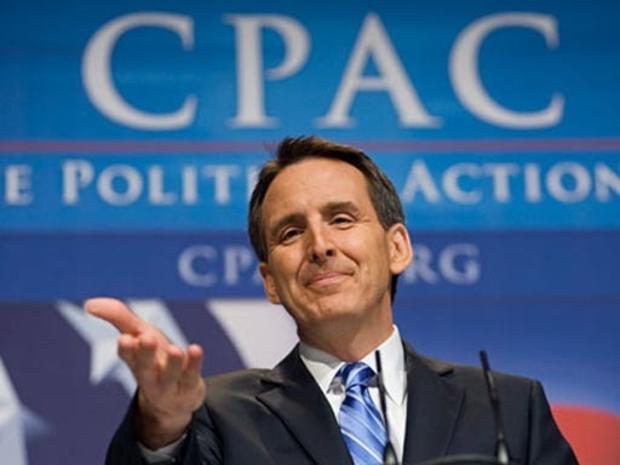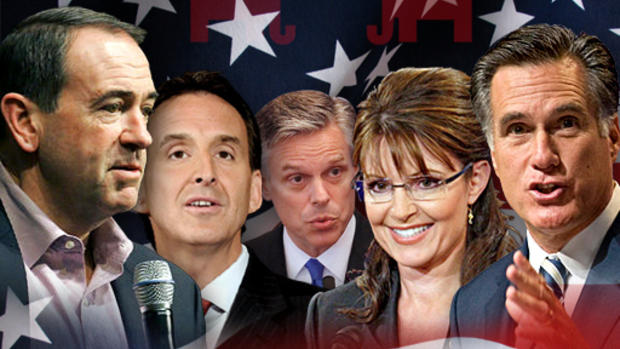Tim Pawlenty's Pre-Pre-Pre-Campaign
This post originally appeared on Slate.
"What do people think when they think about Republicans? What's the stereotype?" he asked. "We're all CEOs or sons or daughters of CEOs. We play polo on the weekends. We never got our fingernails dirty. We drink Chablis and eat brie. Uh, that's not my story, and it's not the story for the Tea Party, and it's not the story for most Republicans."
He mentioned the CEO stereotype a few more times, just to make sure that any reporter at the breakfast meeting would get the message. The only way he could have been less subtle is if he had spelled out M-I-T-T R-O-M-N-E-Y with his sausage links. (Romney is the very wealthy founder and former CEO of Bain Capital, a private-equity firm.) Such a display would have offered a segue into Pawlenty's life story, which started in a meatpacking town. He is the youngest of five children, whose mother died when he was 16. Pawlenty, the only one in his family to attend college, was raised by his truck-driver father.
Presidential candidates generally try to sell themselves as the opposite of the current occupant. So Pawlenty said the next GOP nominee needed to offer an antidote to Obama's cool detachment. "When you walk into a VFW and talk to somebody wearing a Carhartt jacket, drinking a Miller High Life beer, you can explain to them your seven-point plan for health care reform," he said. "But what they mostly want to know is: do your values generally line up with theirs, does your life story generally line up with theirs, do you have some life experiences that would indicate that you understand their circumstances, their challenge, and their worries and they connect to you on a heart and a gut level?"
Pawlenty made his gut pitch at his first Christian Science Monitor breakfast. Even in an age when prospective candidates are jockeying on Facebook and Twitter, the breakfast remains a required stop for presidential candidates (particularly for less well-known ones like Pawlenty). The 44-year tradition allows political candidates to test out ideas in front of national political reporters and get wide exposure for their views. It was at a Monitor breakfast in January 1968 that Robert Kennedy first hinted that he might run for president. In 1991, Bill Clinton hinted at the rumors in his personal life--with his wife also at the breakfast (the idea was to inoculate himself against future disclosures).
Pawlenty had several messages to send. He arrived fresh from his most recent trip to Afghanistan and Iraq. He pointed out that he'd been to Iraq five times and Afghanistan three times. For a candidate without extensive foreign policy experience, it is important to show that you can talk about national security issues.
He spoke with knowledge but no particular insight on the two wars. He opposes Obama's July 2011 deadline for starting to withdraw troops from Afghanistan, saying it is having a corrosive effect on our efforts to get Afghan leaders and the Pakistanis to cooperate. He says none of the military officials he talked to expressed this opinion, though.
Pawlenty is in the position Barack Obama was in when he was a candidate. Perhaps it's the trap all candidates are in. They take trips predicated on gathering facts and seeing things up close, but the trips only serve to confirm their existing positions. Pawlenty's is the conventional Republican view, which means he and his party are on track to use Afghanistan as an issue in 2012 against Obama--just as he used it as an issue against George Bush (and John McCain) in 2008.
Pawlenty is wise to make distinctions on tone, because, as he pointed out, "in the end, there's going to be five, 10, 12 candidates standing on the stage who, at least for now, all look kind of the same. And they're going to say about the same thing. There'll be general agreement as to the content of the message."
He's right. His views are largely indistinguishable from those of his likely opponents. He opposes tax increases to shrink the deficit ("I don't think the argument can be credibly made that the United States of America is undertaxed") and supports Arizona's immigration law ("It has been wildly, irresponsibly mischaracterized by people quoted in the press including the president of the United States"). One area of potential separation from potential rivals is on the TARP, which Romney and Palin supported but which Pawlenty opposed ("I think some creative destruction of some of the misbehavior as it relates to Wall Street firms and investment banks would have been a healthy signal to send.")
Of all of his potential rivals, Pawlenty mentioned only Sarah Palin by name. He pointed out that she might not have to get into the race until later because she's so well-known. That means she doesn't have to spend time introducing herself to people and can raise money quickly. This may be wise analysis, or it may be a trap, if the conventional wisdom is true and voters in early primary states penalize candidates who don't work hard for their vote. A late entrant can be accused of taking the voters for granted.
That's another reason, of course, to attend these Monitor breakfasts: to show reporters that you don't take them for granted. At least on that front, Tim Pawlenty is running ahead of Palin.
More from Slate:
White House vs. WikiLeaks: Who's Right?
Not the Pentagon Papers
Eliot Spitzer: Two Crises Wasted
John Dickerson is a CBS News political analyst. He is also Slate's chief political correspondent and author of On Her Trail. You can also follow him on Twitter here.


